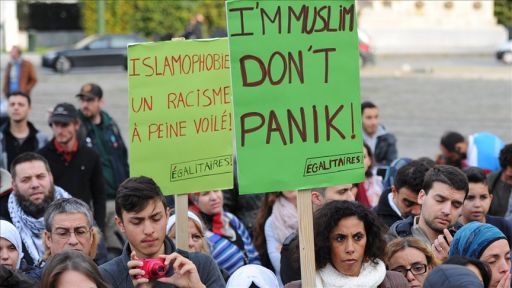90% of discrimination cases in Belgium involve Muslims

Patrick Charlier, director of the Interfederal Centre for Equal Opportunities (Unia), highlighted the concerning rise of anti-Muslim sentiment across Europe, noting that in Belgium, nine of 10 people facing discrimination are Muslim, particularly veiled women.
A report released last week by the EU Agency for Fundamental Rights (FRA), "Being Muslim in the EU: Experiences of Muslims," showed a marked increase in racism and discrimination against Muslims since 2016.
The survey, conducted with responses from 9,000 respondents across 13 EU member states between October 2021 and October 2022, found that one in two Muslims encounter discriminatory treatment daily.
Discrimination against Muslim women, men and children stems not only from their religion but is also due to factors like skin color, ethnic background and immigration history. Young Muslims born in Europe and veiled women are particularly affected.
Belgium has emerged as a key area for the issues, with 43% of Muslims in that country reporting housing discrimination.
Charlier, who has led the Equal Opportunities Center since 1993, emphasized the severity of the situation, pointing to hostility toward Muslims in education, employment and society.
“For Belgium, when we're speaking of religious and philosophical belief, it's 90% concerning Muslims. The vast majority, nine cases out of 10, is according to Muslims that are facing discrimination, hate speech, hate crime,” said Charlier.
“The last year, the most remarkable cases are in employment, discrimination in employment. It's a majority of women that are victims of discrimination. When we are speaking of women in employment, that's mostly cases of headscarves,” he said.
Between 2017 and 2023, the center primarily addressed employment discrimination cases, with additional incidents occurring on social media and in schools, noted Charlier.
Anti-immigrant sentiment also fueling anti-Muslim sentiment
“I think discrimination, hate speech and hate crime is grave. I don't want to undermine the reality and the difficulty for Muslims in our country. That's a reality. It's not highly rising. It's stable,” he said.
“We are not out with discrimination against Muslims. We are not out on Islamophobia. There is an indirect link also with a form of what we call more xenophobia,” he said.
“That’s all the discourse against asylum seekers and migration. It’s not directly focused on Muslims, but we know that this discourse against migrants is often with the idea ‘that's Muslims that are coming from Syria, from now Palestine, from Afghanistan, and so on.’ But that’s not registered to us as ‘discrimination against Muslims’. It’s more xenophobia,” he added.
AA







